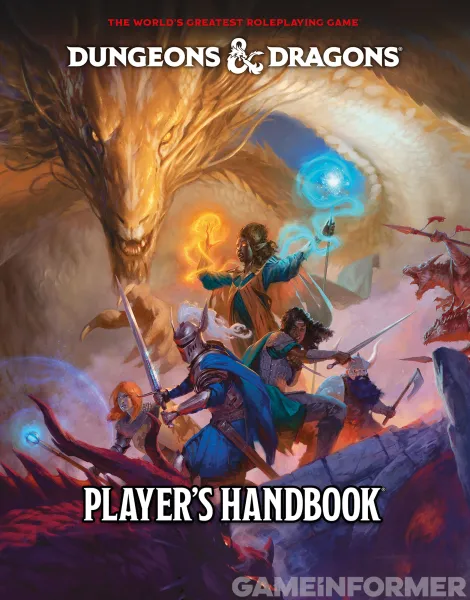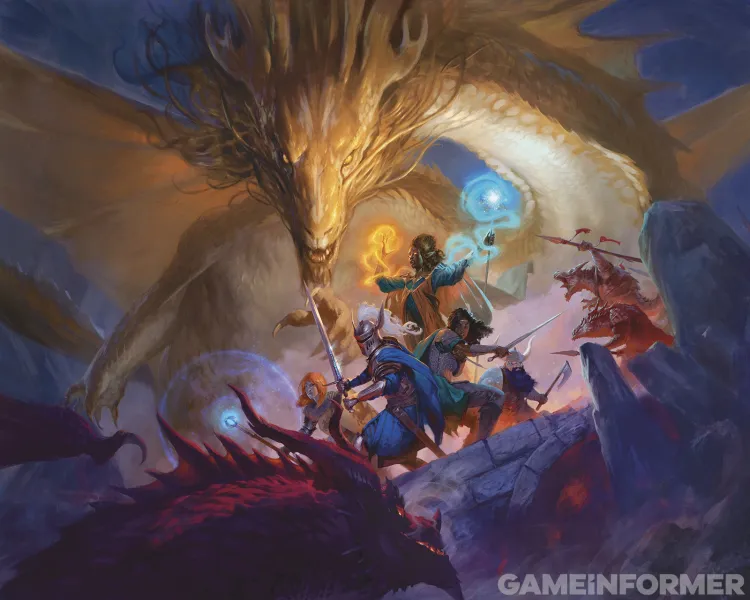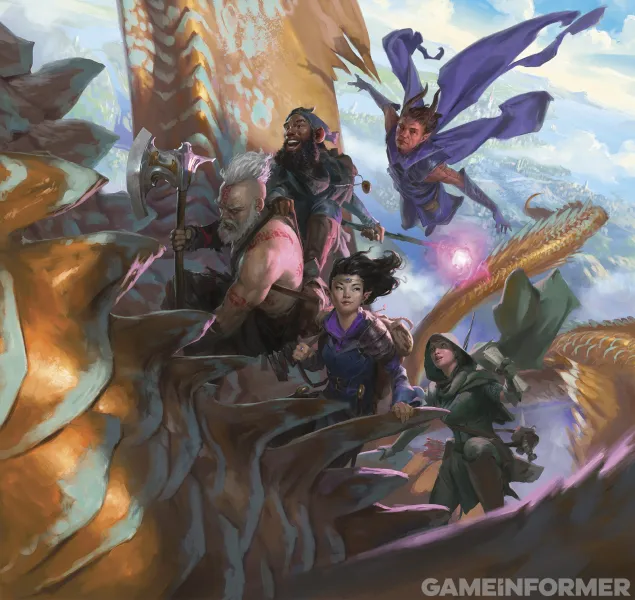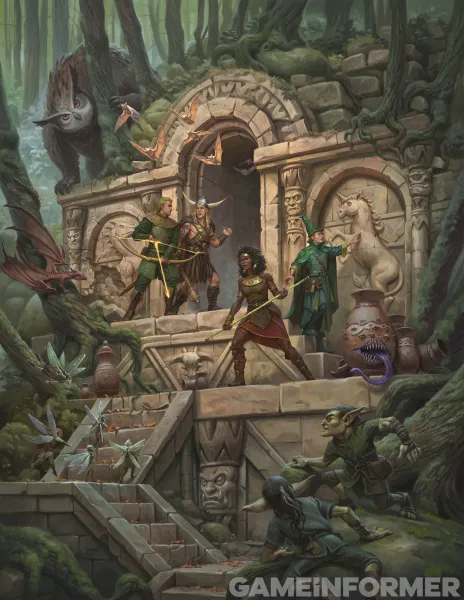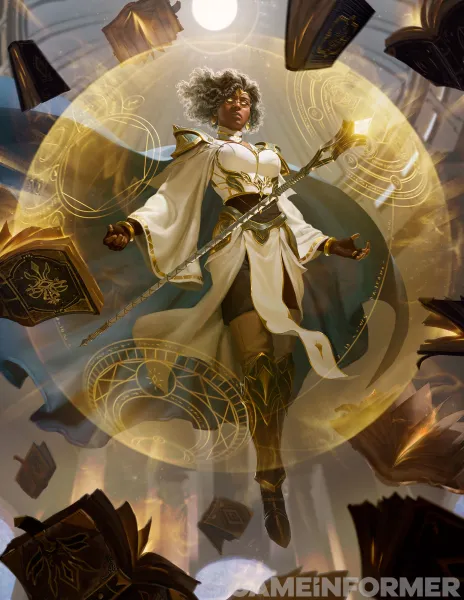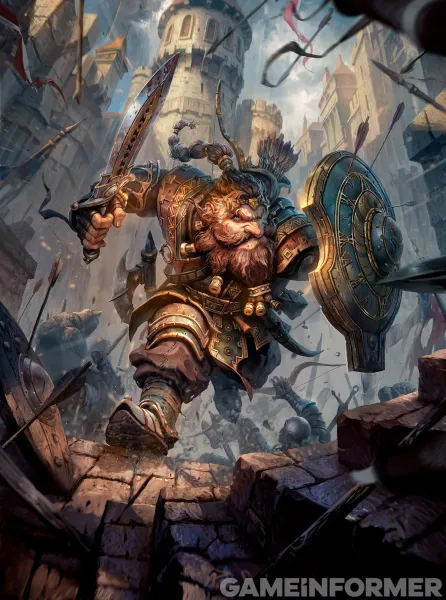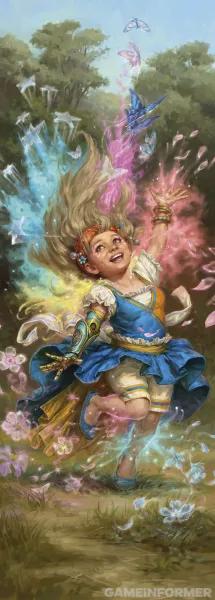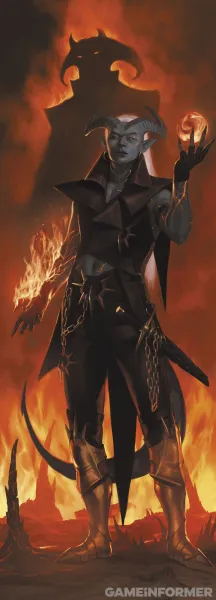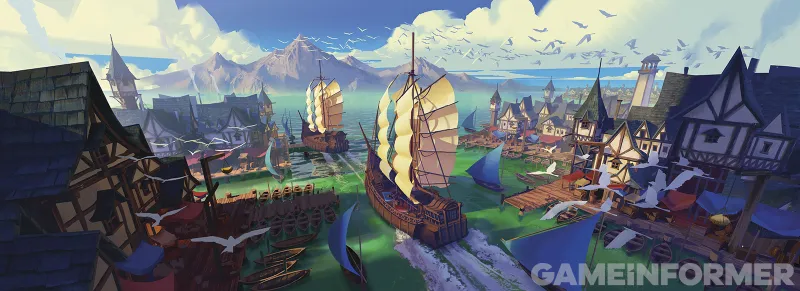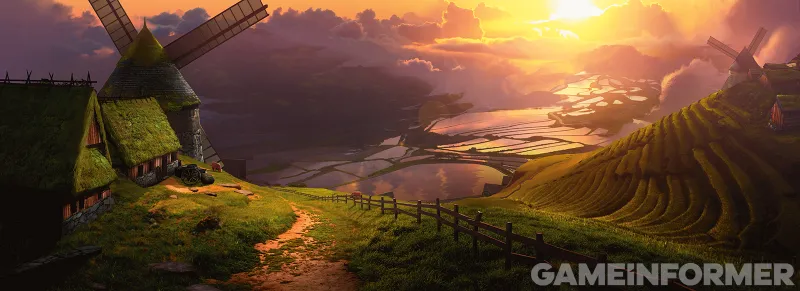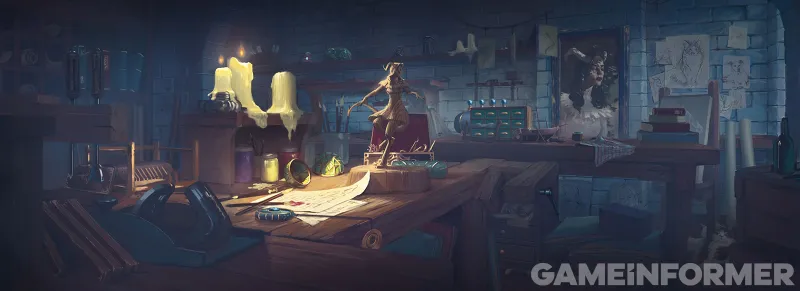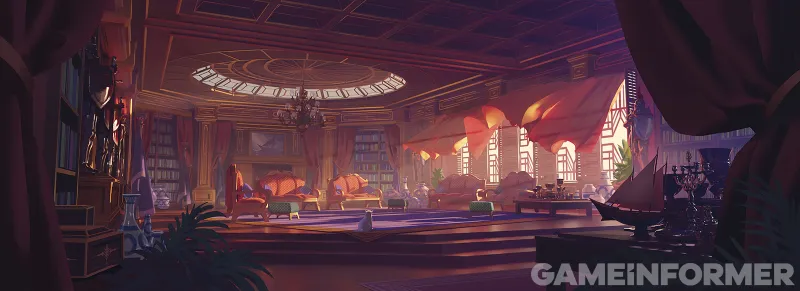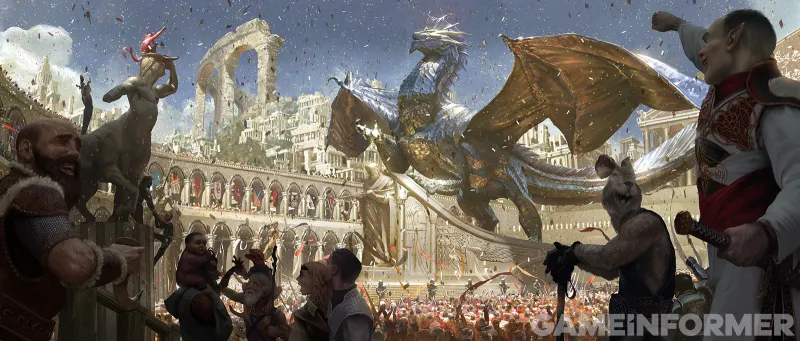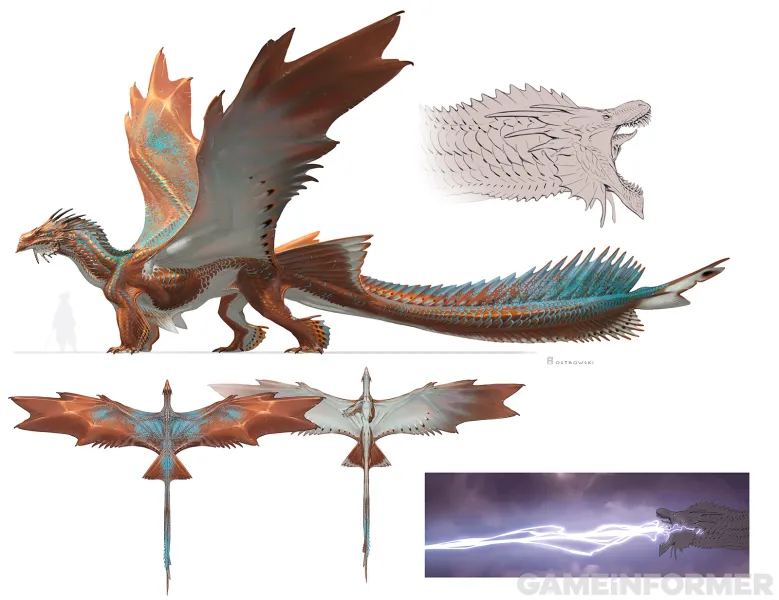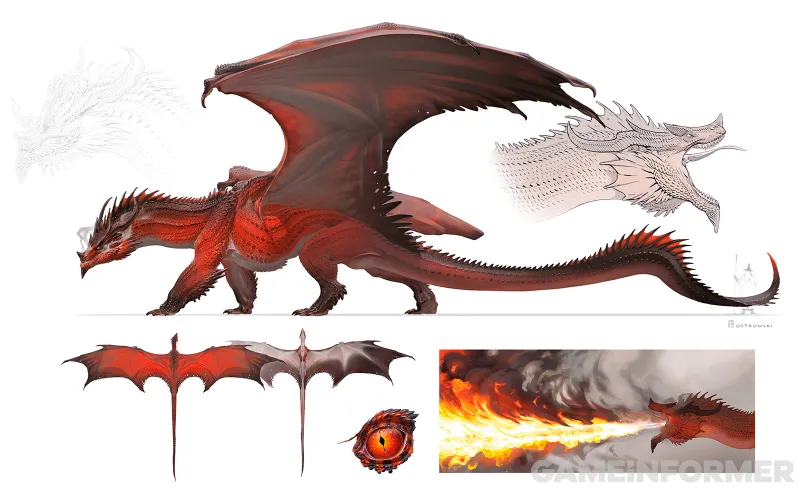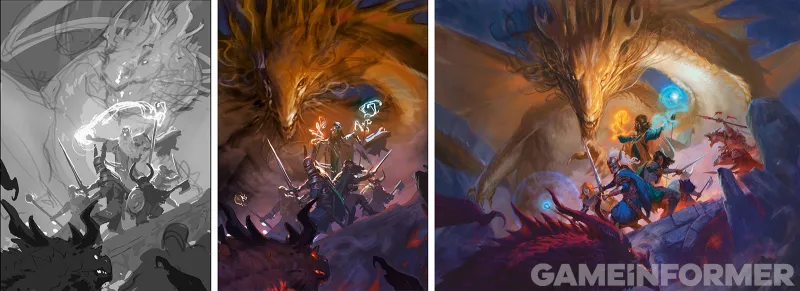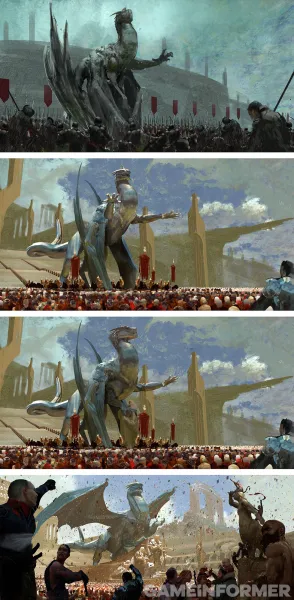Dungeons & Dragons has a big year ahead of it. The classic tabletop RPG is celebrating its 50th anniversary this year, and the most significant event of that celebration is undoubtedly the release of a revision for the game’s core rules, including the Player’s Handbook, Dungeon Master’s Guide, and Monster Manual. Backwards-compatible with the entirety of the 5th edition of the game, the new books are nonetheless a big new step forward for the game, reflecting a decade of iteration and evolution as the game has exploded in popularity.
The books aren’t far off. Players and Dungeon Masters alike can watch for pre-orders starting on June 18; each book is set to be priced at $49.99. Each of the three new books comes in at a hefty 384 pages apiece.
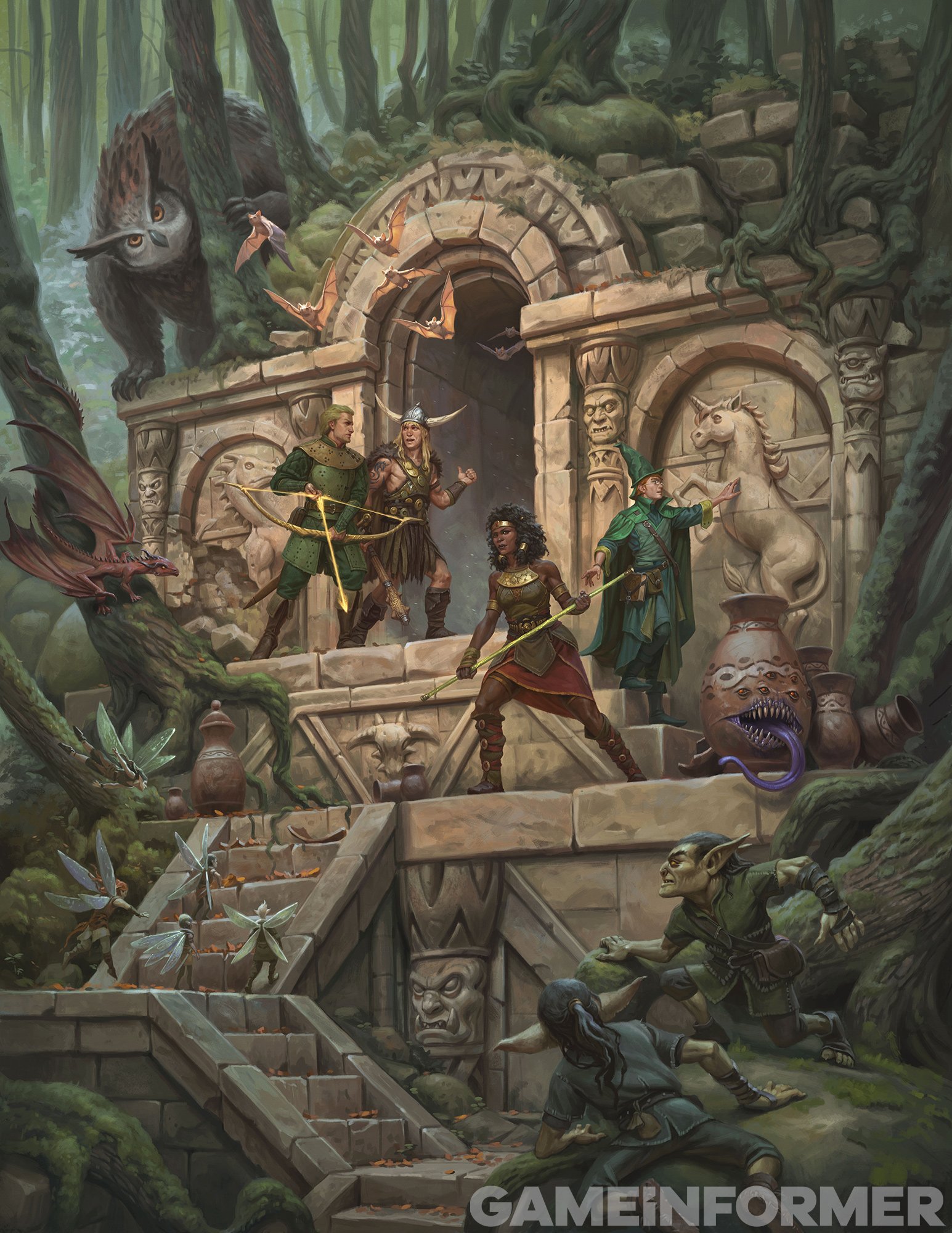
Characters from the classic D&D cartoon get a makeover in this internal art from a chapter opener in the new Player’s Handbook. Artist Credit: Dmitry Burmak
We had the good fortune to visit Wizards of the Coast a few weeks ago to learn more from the artists and designers about what to expect in the revised game, and we have a ton of exclusive details about the revised D&D in this month’s Game Informer magazine. The magazine article includes extensive insight from Wizards of the Coast designers, including Chris Perkins and Jeremy Crawford. Our conversations with the designers offer great depth into what to expect out of each of the three core books on the way. We hope you’ll support that kind of exclusive coverage of D&D with a subscription to GI for less than $2 an issue so you can check the article out for yourself.

In addition to all the fun new design insights discussed in our magazine article, we also wanted to show off some of the remarkable art coming as part of the latest books. We’re including that here, alongside details from the art team working to craft the game’s look.
We’re especially excited to reveal a close look at the cover art for the new Player’s Handbook.
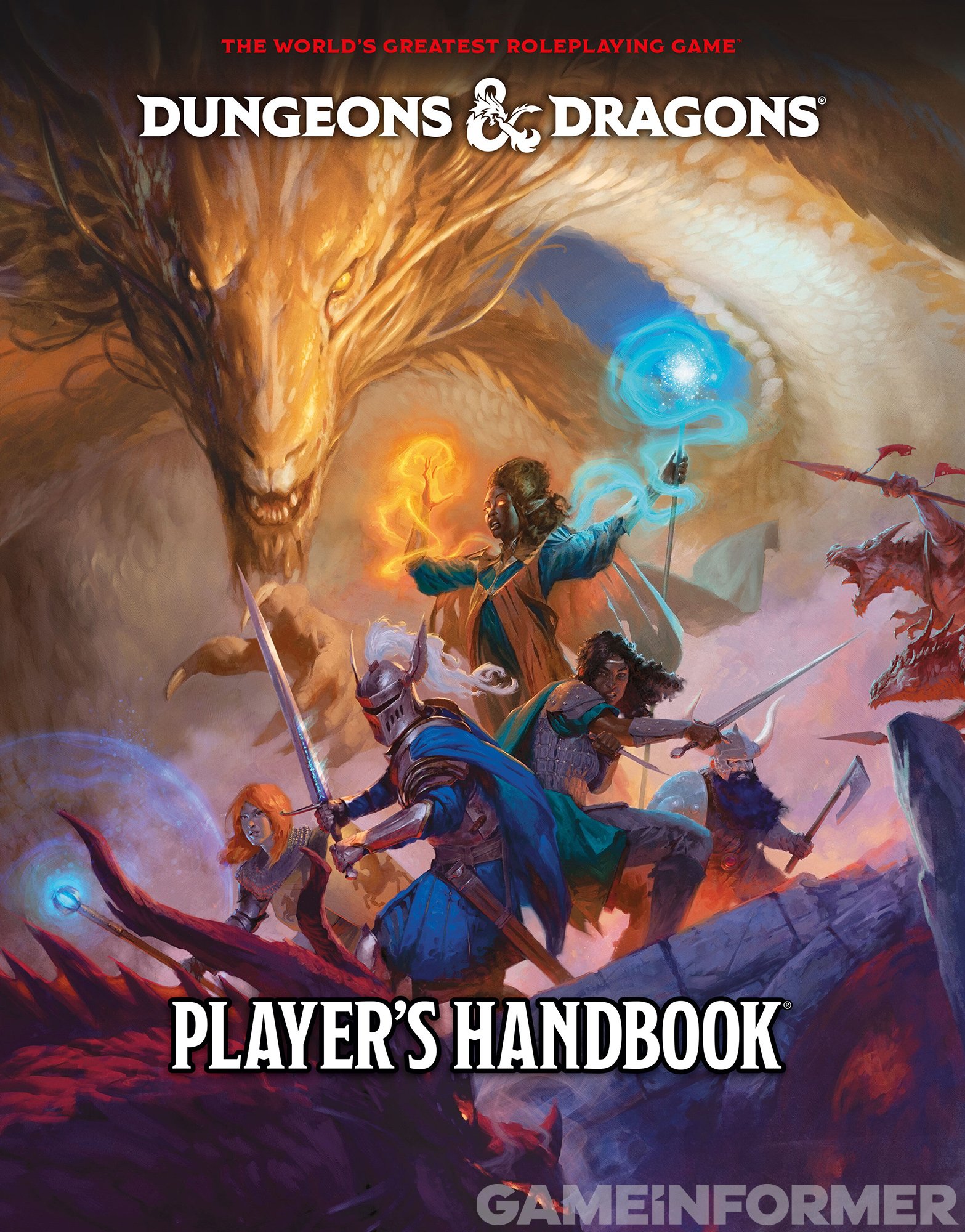
The front cover of the newly revised version of D&D’s Player’s Handbook. Artist Credit: Tyler Jacobson
As the first planned release of the three new core rulebooks, it’s also likely the one that’s most important to the broadest swath of D&D players; its appearance in each prior edition has helped define the tone of the game.
The new Player’s Handbook front cover embraces the game’s revitalized approach to pushing forward legendary characters from across the history of the game. We see the likes of Yolande the Elven queen, Strongheart the knight, Elkhorn the Dwarven warrior, the divine Mercion, and the rogueish Molliver, all charging together into an adventure. These are figures hearkening back to the earliest era of the game. Wrapped around them is a benevolent gold dragon – a nod to the “golden” 50th anniversary of the game and an enticing reminder that the dragons in the game’s title can be allies as frequently as enemies.
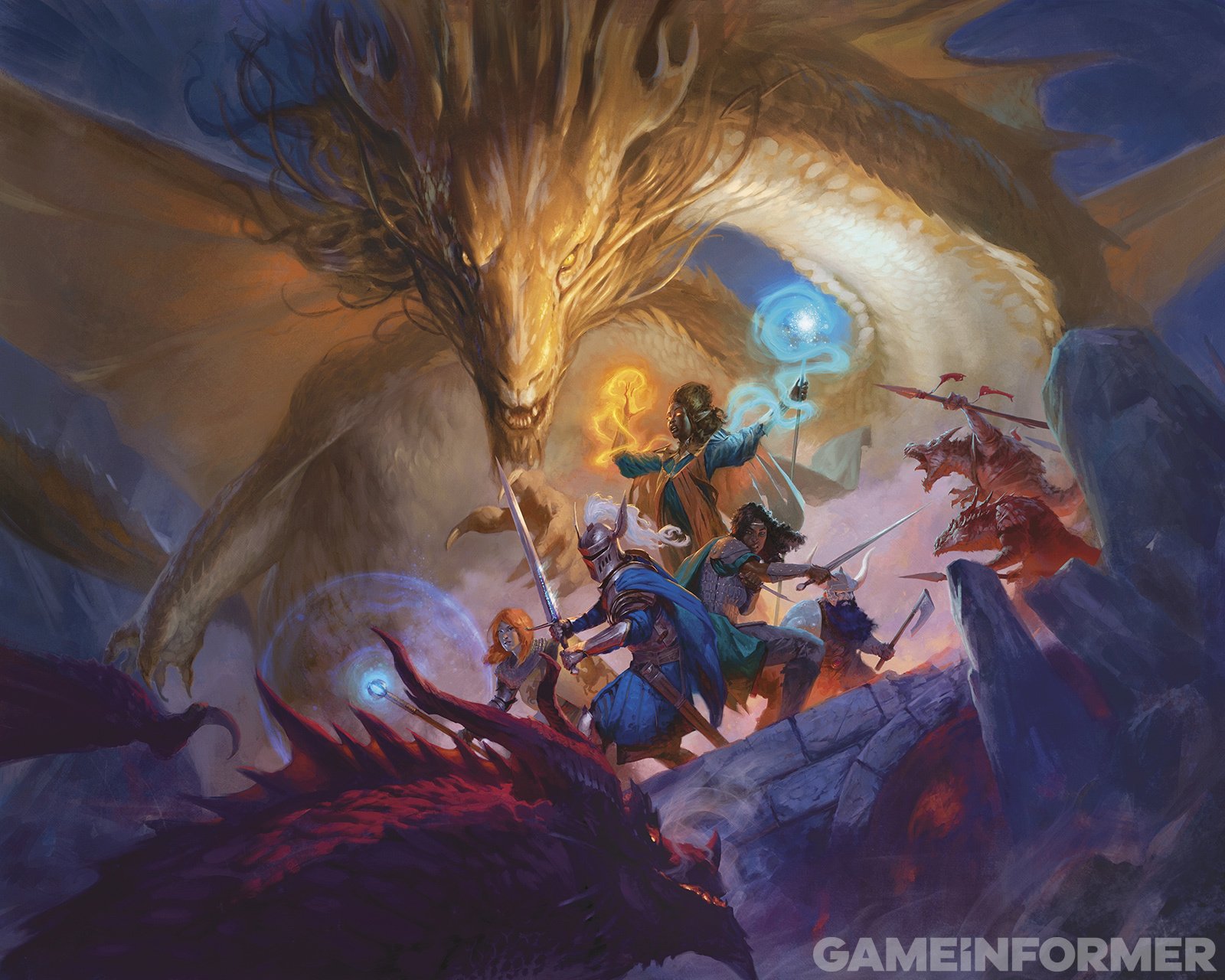
A gold dragon teams up with a party of legendary heroes to confront a red dragon and its kobold minions in the full front cover art for the new Player’s Handbook. Artist Credit: Tyler Jacobson
The new cover art comes from the experienced hand of freelance illustrator, Tyler Jacobson. “I’ve worked on DND since 2009. And I did the covers back in the fifth edition,” Jacobson says. “I did the Player’s Handbook and the Dungeon Master’s Guide, as well as many of the other covers that came after that for [titles] like Storm King’s Thunder and Volo’s.”
The direction for the cover art is highly intentional, meant to reflect the content inside. “With the cover art, we wanted to represent each experience,” Jacobson says. “How do we make the Player’s Handbook look like it’s the players’ experience? And how do we make the Dungeon Master’s Guide feel like the Dungeon Master’s experience?”
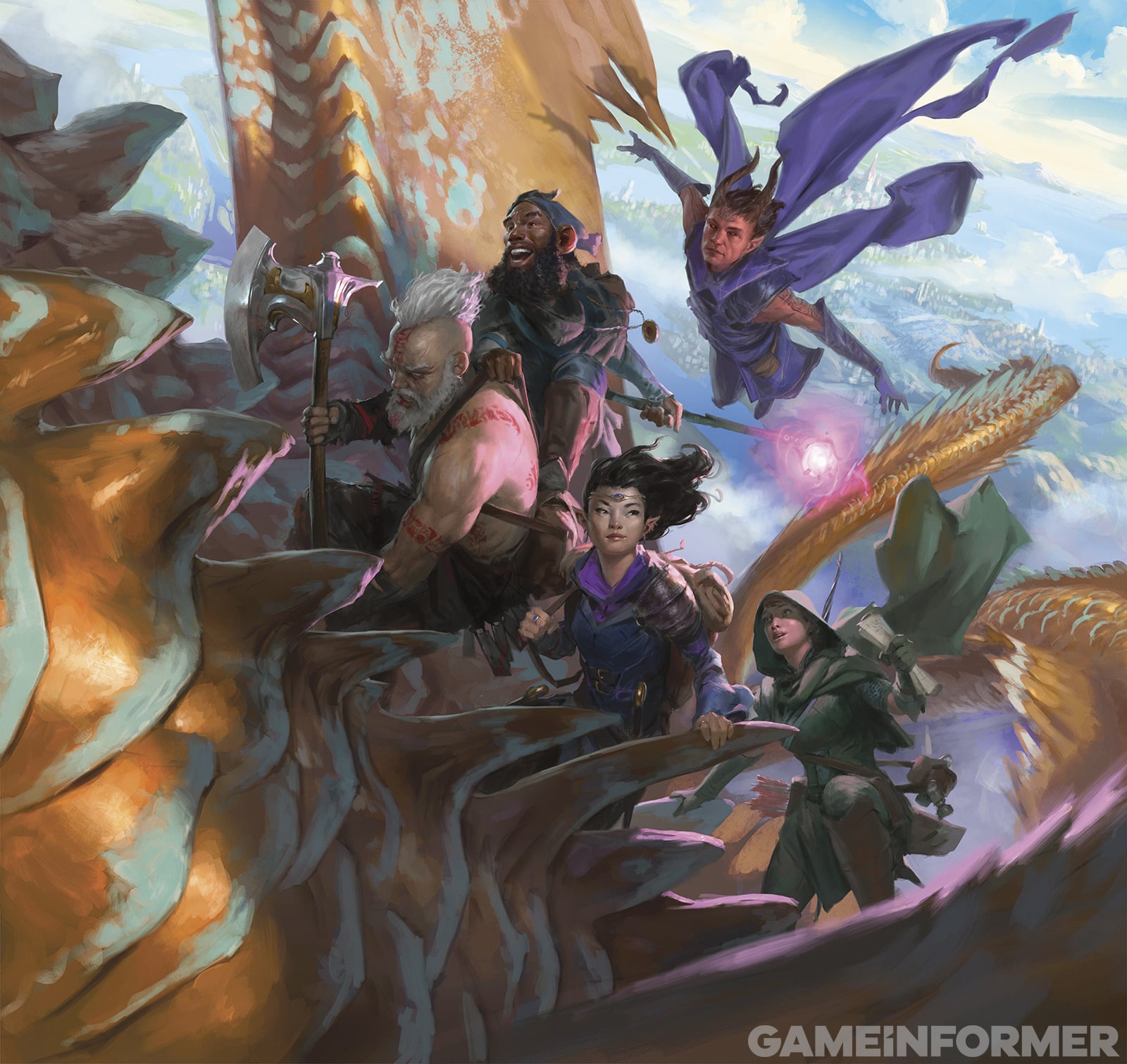
The back cover of the Player’s Handbook features an unknown party of adventurers flying into danger on the back of a bronze dragon. Artist Credit: Tyler Jacobson
A separate piece of art on the reverse side of the Player’s Handbook goes the other direction from the mythical heroes depicted on the front, depicting a party of unknown heroes, and nodding to players who will craft their own legends.
The new Player’s Handbook (and all the rulebooks moving forward into this new era of the game) features a red book spine, which, in my mind, subtly nods to some classic visual cues like the classic red boxed set from the 1980s. But whether that’s intentional or not, the red hue also easily sets the new books apart from any other recent rulebooks you have on your shelf.
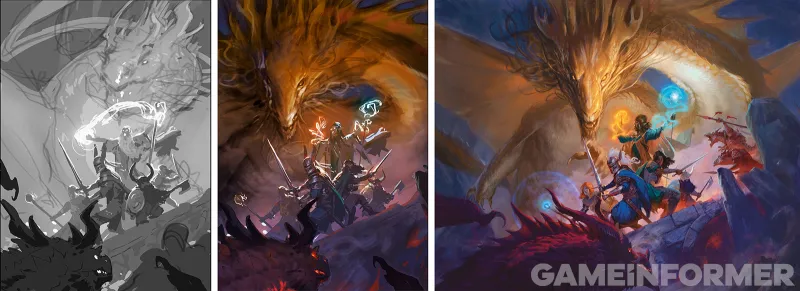
From sketch to completed art of the new Player’s Handbook. Artist Credit: Tyler Jacobson
Early book printings will bear a D&D 50th seal on the back – a recognition of the big five-decade anniversary.
As fans have come to expect, you can also look forward to alternate book covers available in your local game store – the new alternate Player’s Handbook depicts a gorgeous scene of elves and a sinuous gold dragon, all printed in a gold foil treatment.
Beyond the cover, there’s no shortage of art filling the books’ pages, as evidenced by the extensive visuals we saw from the interior pages of the Player’s Handbook.

Artist Néstor Ossandón Leal shows the process from sketch to completed art. Artist Credit: Néstor Ossandón Leal
“A lot of our chapter openers are famous heroes,” says studio art director Josh Herman. “Almost every chapter opening features a different hero, or group of heroes in a different setting. So, you’ve got Dragonlance, and other ones, like Ravenloft; you’ve got a whole suite of them. Whereas the Dungeon Master’s Guide is all about villains. The cover is all about the villains and the sort of threats that the DM gets to play up. And in that art, you get to see a lot of our famous locations and some of our famous villains in its chapter openers. So, it’s sort of like the opposite side of the coin; we want to present all of the facets of the game in a way that hopefully people can understand.”
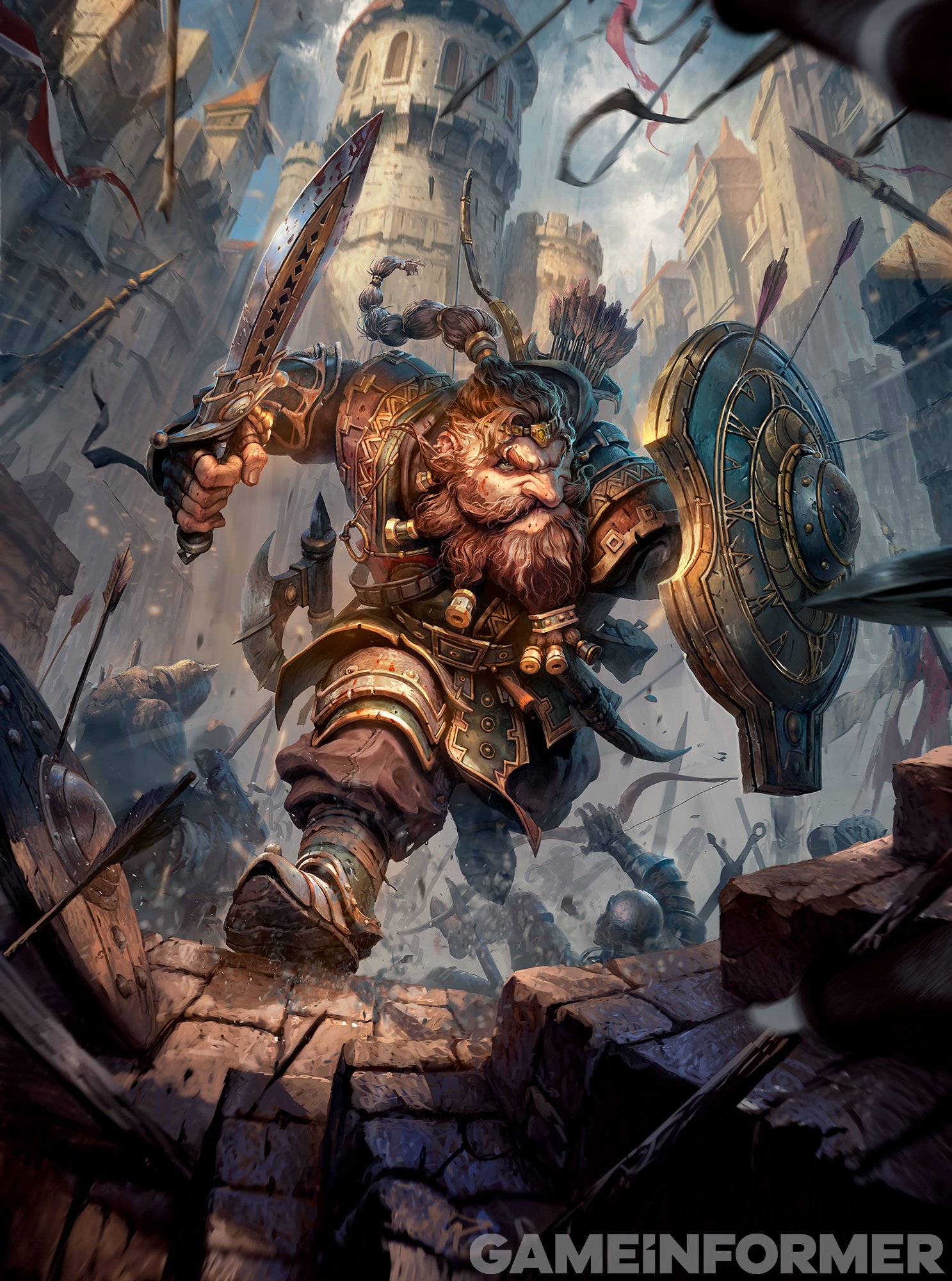
The completed art that launches the Fighter class section in the Player’s Handbook. Artist Credit: Néstor Ossandón Leal
I was especially struck by the mix of characters and settings on display in the revised books. Where many prior official books seemed to default to the familiar Forgotten Realms setting (chief home of the Baldur’s Gate video games), these new core books seem to embrace the multiversal nature of D&D, including the characters and locations of myriad worlds. “I think like 10 years after [5th edition’s launch], all of these settings have come out,” Herman says. “Like Spelljammer, Dragonlance, Planescape. That’s probably why the differences are so much there; we want to show off all the different ways that players can play just like you can choose any type of character, and we want to create a broad gamut for you to pick from.”
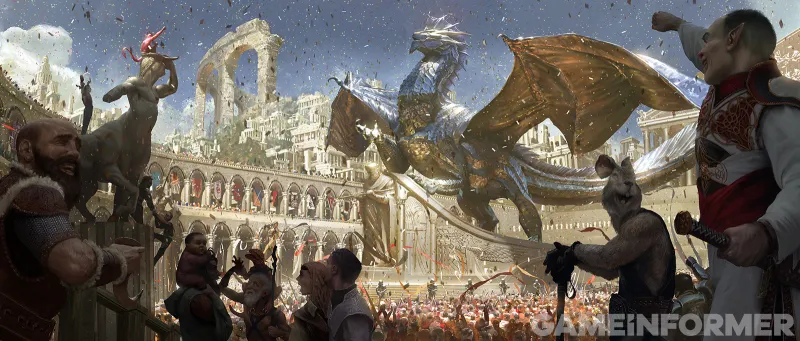
A silver dragon enjoys the adulation of a city’s parade route. Artist Credit: Campbell White
The art in the new core books has a chief goal of helping to further an understanding of the game. Spells are often shown being cast. Art for character backgrounds shows a possible place your hero could have come from. It even extends to the visuals of creatures in the Monster Manual. “There’s a lot of mindfulness about the mixture; to pick the monster design accurately to the stat block,” says art director Emi Tanji. “If it’s a creature that does slashing damage or something like you want to make sure we see claws. And you want to make sure if the art has shows something that’s like a stinger, but there’s nothing in the stat block – that would be weird, right?”
As I had the chance to explore completed pages during my visit to Wizards of the Coast, I was impressed by the bounty of art that fleshes out the books and how the art is presented to act as a visual tool for organization. “We worked with the design team to ensure that every class starts with the left-hand page,” Herman says. “Whereas before in 2014, it was just kind of a running journal. Now what we wanted to do is every class would open with a full-page piece of art on the left-hand side with a similar set of lead data on the right hand, so that every time you get to a new class, you get sort of an immediate visual, which we tried to theme around almost like an iconic version of what that class is.”
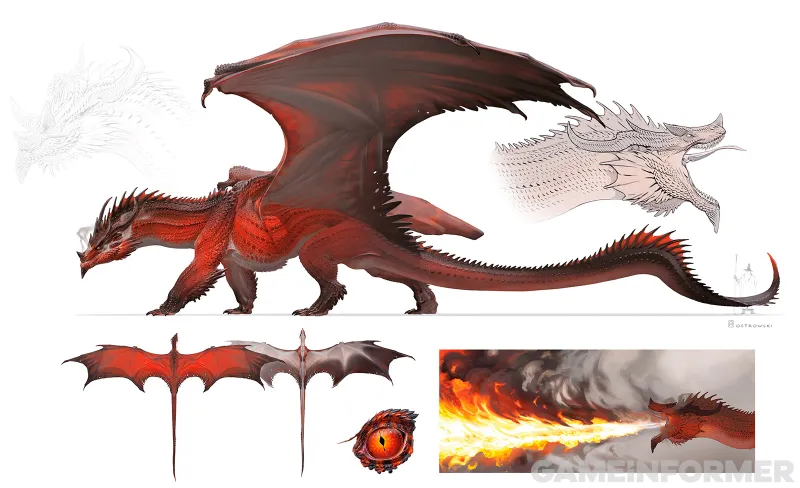
Concept art reveals the redesigned look for the red dragon. Artist Credit: Alexander Ostrowski
The revised books also gave the art and design team at Wizards of the Coast a chance to return to some of its most iconic visuals and refine the approach, including the titular dragons of the classic five metallic and five chromatic species. “All the dragon stuff was really great,” Herman says “We went through all 10 of them. We have new designs for all of those and there will be a lot of that in the Monster Manual for sure. We are trying to update those designs to be something in which players could see that dragon’s personality or what biome they live in, or where they fit in the cast of all of the dragons.”
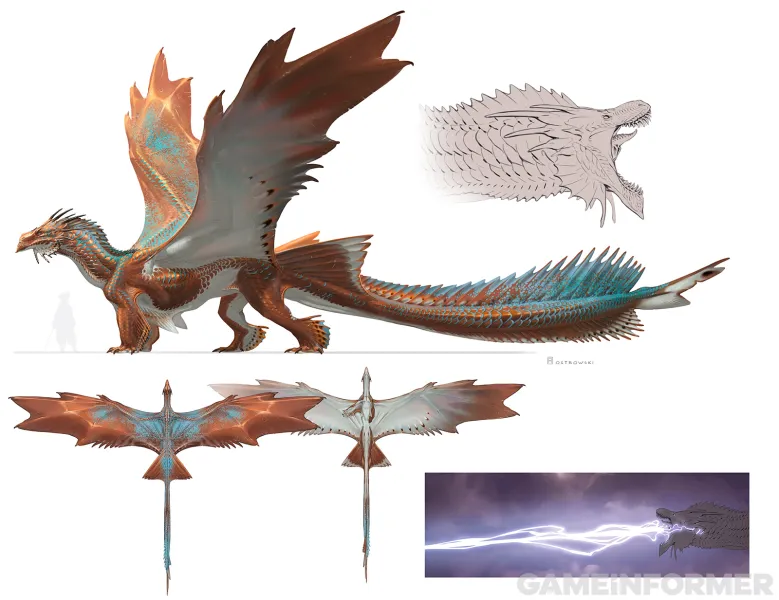
The new look for the bronze dragon, and concepts for its breath weapon. Artist Credit: Alexander Ostrowski
As a longtime D&D player, I came away from perusing this new version of D&D with a lot of excitement. The art we’re sharing here publicly is just a sampling of what I had the opportunity to look over; there’s a cohesive visual language to the new books that is enticing. And I love the way the game seems to embrace the long history of heroes, villains, and iconic named monsters that have arisen over 50 years of play.
If the art on display here has you excited, I hope you don’t miss out on our in-depth tour of the design work expressed in the books themselves, as described in this month’s Game Informer magazine. Our eight-page article includes details on all three books, including new character options, building player bastions, new apex-tier monsters on the way, and the surprising importance and inclusions of what is arguably the oldest D&D campaign setting of them all – Greyhawk. In a magazine that is chiefly focused on video games, we figuratively rolled the dice on offering this level of depth on a tabletop game like D&D in one of our issues, thanks to its incredible influence on gaming, and its recent success and reach to newcomers. If that kind of coverage is something you like, we’d appreciate your support in checking out the magazine.
In the meantime, enjoy exploring the breadth of all this new Dungeons & Dragons art! Click through the gallery below for full-size images of all the art included in this article, plus additional first-look pieces on the way in the new books.
